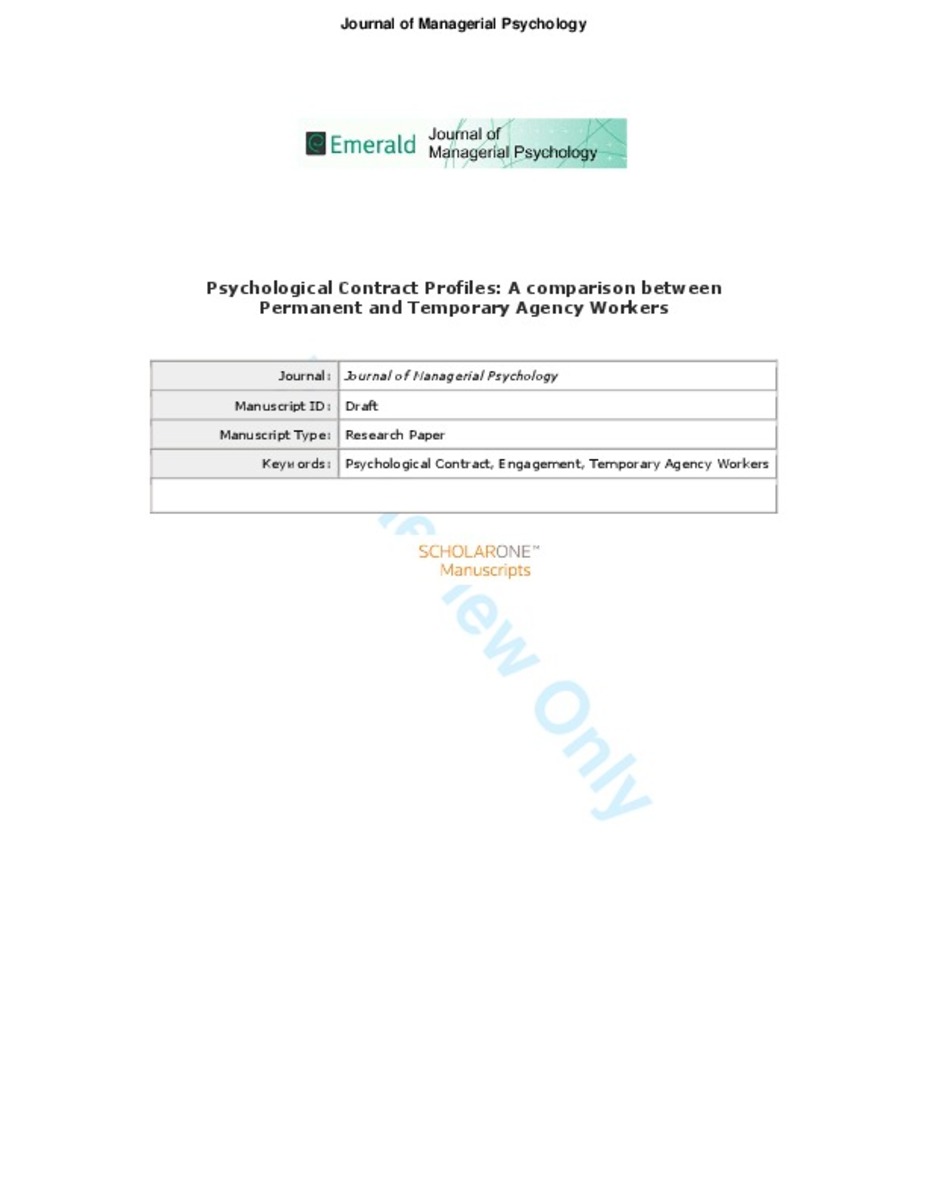Mostrar el registro sencillo del ítem
Psychological contract profiles among permanent and temporary agency workers
| dc.contributor.author | Chambel, Maria José | |
| dc.contributor.author | Lorente Prieto, Laura | |
| dc.contributor.author | Carvalho, Vânia | |
| dc.contributor.author | Martinez, Isabel M. | |
| dc.date.accessioned | 2016-03-22T10:09:00Z | |
| dc.date.available | 2016-03-22T10:09:00Z | |
| dc.date.issued | 2016 | |
| dc.identifier.citation | CHAMBEL, Maria J., et al. Psychological contract profiles among permanent and temporary agency workers. Journal of Managerial Psychology, 2016, vol. 31, no 1, p. 79-94. | ca_CA |
| dc.identifier.issn | 0268-3946 | |
| dc.identifier.uri | http://hdl.handle.net/10234/154785 | |
| dc.description.abstract | Purpose: – Based on the psychological contract (PC) theory, the purpose of this paper is to identify PC profiles, differentiating between permanent and temporary agency workers (TAW). Moreover, the authors analyzed whether different profiles presented different levels of work engagement. Design/methodology/approach: – A cross-sectional survey data analysis of 2,867 workers, of whom 1,046 were TAW, was analyzed using latent profile analyses. Findings: – Four PC profiles were identified, which differed quantitatively in terms of the overall dimension levels (i.e. balanced, relational and transactional) for PC (i.e. content and fulfillment). ANCOVAs showed that the relational/balanced dominant and transactional dominant profiles presented similar engagement levels for TAW, but for permanent workers the former profile showed higher engagement than the latter. However, for both permanent and TAW the fulfillment profile showed higher engagement than the unfulfillment profile. Research limitations/implications: – The cross-sectional design and the reliance on self-report measures are the limitations of this study, although no causality was claimed and method biases were controlled. Practical implications: – Actions that increase PC fulfillment positively affect the employment relationship of TAW with the client organization. Originality/value: – Few studies have addressed PC typologies. Furthermore, most studies have focussed on temporary workers, but not on TAW and their contract with the client organization. Finally, this study emphasizes the crucial role played by the PC in the levels of work engagement. | ca_CA |
| dc.description.sponsorShip | This study is part of a larger research project “Temporary agency workers’ transitions: motives, experiences and outcomes – PTDC/MHC-PSO/4399/2012” founded by the Foundation of Science and Technology from Portuguese Government. This grant is gratefully acknowledged. The authors are grateful to Lois Tetrick, René Schalk and two anonymous reviewers for their comments and suggestions on earlier drafts of this paper. | ca_CA |
| dc.format.mimetype | application/pdf | ca_CA |
| dc.language.iso | eng | ca_CA |
| dc.publisher | Emerald | ca_CA |
| dc.relation.isPartOf | Journal of Managerial Psychology, 2016, vol. 31, no 1 | ca_CA |
| dc.rights | © Emerald Group Publishing Limited | ca_CA |
| dc.rights.uri | http://rightsstatements.org/vocab/InC/1.0/ | * |
| dc.subject | temporary agency workers | ca_CA |
| dc.subject | work engagement | ca_CA |
| dc.subject | permanent workers | ca_CA |
| dc.subject | psychological contract profiles | ca_CA |
| dc.title | Psychological contract profiles among permanent and temporary agency workers | ca_CA |
| dc.type | info:eu-repo/semantics/article | ca_CA |
| dc.identifier.doi | http://dx.doi.org/10.1108/JMP-02-2014-0070 | |
| dc.rights.accessRights | info:eu-repo/semantics/openAccess | ca_CA |
| dc.relation.publisherVersion | http://www.emeraldinsight.com/doi/full/10.1108/JMP-02-2014-0070 | ca_CA |
| dc.type.version | info:eu-repo/semantics/publishedVersion | ca_CA |
Ficheros en el ítem
Este ítem aparece en la(s) siguiente(s) colección(ones)
-
PSI_Articles [594]
Articles de publicacions periòdiques







